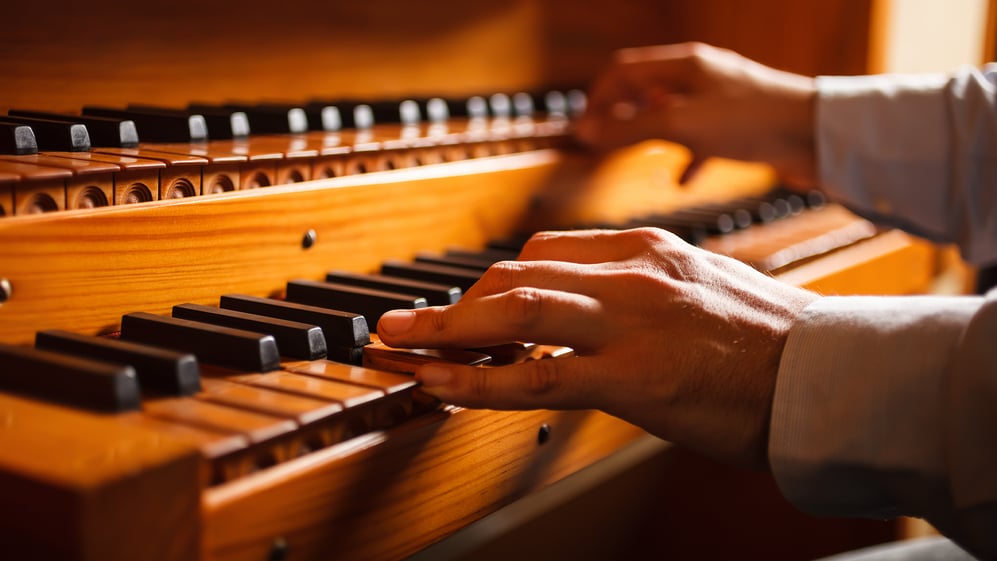You may have heard someone in your church referred to as a cantor (sometimes spelled “kantor”). You probably know that a cantor works with church music, but what makes a cantor distinct from an organist or director of church music? Carl Schalk provides insight into what a cantor is historically in church tradition and what it means for us today. The following has been adapted from The Cantor in the Lutheran Tradition.
What It Means to Be a Cantor
The word cantor is the traditional term used by Lutherans for those responsible for “shaping, developing, and nurturing the musical life of the congregation at worship.” While a cantor’s specific duties may vary from one congregation to another, they typically include leading the music of the congregation from the
organ or a keyboard, preparing and directing a variety of choirs and instrumental ensembles, and planning and carrying out an effective music program in the life of the congregation.
The title of “cantor” suggests a larger sense of vocation, purpose, and ministry than many might associate with titles such as “director of music,” “organist,” or “choir director.” It suggests a broader understanding and vision. It resonates to a greater sense of purpose.
The term “cantor” should not be reserved only for larger congregations with abundant musical resources. It is, in fact, in smaller congregations that the cantor can be particularly effective. But whatever the circumstances, the role of cantor in Lutheran congregations can be important and crucial in developing and nurturing a richer worship life.
Role of a Cantor—Two Perspectives
Lutheran cantors understand their role from two distinct yet inevitably interconnected perspectives. They are, to be sure, church musicians. They are, simultaneously, church musicians. An effective cantor is always conscious of both perspectives.
Music is the medium through which the cantor works. Cantors need specific musical skills, which they continuously seek to develop and improve. Such growth may occur through private individual study, formal academic training, attendance at conferences and seminars, or in mentoring situations. The cantor, from this perspective, is concerned with continued, intentional, personal growth in musical skills in the service of the worship life of the congregation.
The second perspective, equally important but often overlooked, is that the cantor is simultaneously a church musician. It is the Church’s song they teach, tend, nurture, and lead in congregational life. As leaders of the Church’s song, cantors must be theologically informed and astute in their theological judgment. The cantor’s responsibility involves a commitment to the faith of
the Church, its liturgical life, and the implications of the Church’s
theology for the musical aspects of the congregation’s worship life.
Cantor and Church Tradition
Luther received this liturgical and musical tradition as a good and gracious gift of God, celebrated and nurtured it in his time, corrected it where he understood it to be in error, and handed it on to the generations following. It is the primary role of Lutheran cantors today to do the same: to receive that tradition as a gracious gift of God, to nurture and celebrate it, to move it forward in our time, and then to hand it over to the following generation.
Cantor’s Third Role
At the beginning of this blog, two aspects of the cantor’s role were mentioned: that of church musician and church musician. There is a third aspect of the cantor’s role, however, that should permeate all that has been discussed here. Simply put, cantors truly care for those they teach, lead, and work with as they sing the Church’s song.
Like the Good Shepherd, cantors know those in their care. They are truly concerned about them, not simply as parts of a music program but also as individuals who, like themselves, are on a journey of faith. They rejoice with them in times of accomplishment and celebration. They mourn with them in times of sorrow.
What unites the cantor and those they lead is the faith they share and the desire to give it expression through the gift of music. To be a member of a congregation or a choir whose cantor shares a common faith and purpose, to praise God through His gift of music, is a precious gift. To be a cantor serving such a congregation, open to explore the riches of the Lutheran tradition of
worship and music, is a gift not to be underestimated.
Text adapted from The Cantor in the Lutheran Tradition (pp. 4–9, 22) © 2022 The Estate of Carl F. Schalk. Published by Concordia Publishing House. All rights reserved.
 To learn more about a cantor’s role, read The Cantor in the Lutheran Tradition.
To learn more about a cantor’s role, read The Cantor in the Lutheran Tradition.











